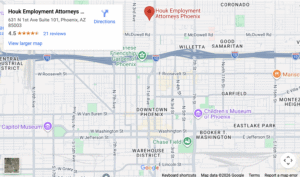
Do you work overtime and receive minimum wage? Workers deserve to be paid their full wages for the hours they work. Discuss your case with our Phoenix overtime and minimum wage lawyer at Houk Employment Attorneys. Contact us today at (480) 569-2377 to schedule a consultation.
State and federal laws protect an employee’s right to fair and prompt payment of wages. Overtime & minimum wage violations are two of the most common violations of wage laws in Arizona. At Houk Employment Attorneys, we are committed to helping you resolve overtime & minimum wage disputes as quickly as possible. We understand what is at stake when parties are in a dispute over compensation.
Attorney Christopher Houk has almost 20 years of experience in employment law. He leads a team of skilled lawyers with decades of combined experience. They are seasoned trial attorneys and skillful negotiators. Our legal team is equipped to handle the most complex overtime & minimum wage disputes.
How Our Phoenix Employment Lawyers Help You With an Overtime & Minimum Wage Dispute in Arizona

Your time and work is valuable. You deserve to be paid the wages you earned. However, employer misconduct could result in unpaid wages and overtime. If you believe your employer is cheating you out of the money you have earned, you can do something about it.
Our Phoenix employment law attorneys have extensive experience in all matters related to wage disputes. We can help you take legal action to obtain your earned wages and overtime. In some situations, you may be entitled to compensation for damages caused by your employer’s failure to pay earned wages.
When you hire our top-rated labor law attorneys, you can trust we will:
- Investigate the circumstances of your case to gather evidence supporting your claim
- Determine the most efficient course of action to obtain your unpaid wages
- Monitor deadlines for filing claims with state and federal agencies
- Prepare and file all paperwork necessary to pursue claims and lawsuits
- Correctly calculate the amount of your unpaid wages and the value of other damages
- Negotiate a fair settlement that compensates you for your earnings and damages
- File a lawsuit and take your case to trial if settlement is impossible
Our attorneys have earned recognition from national legal organizations, including Super Lawyers. We have a perfect 10.0 rating with Avvo. Our dedication to our clients and experience in employment law sets us apart from other law firms.
Contact Houk Employment Attorneys for a consultation with a Phoenix employment attorney. If your employer mistreats you, we help you fight for fair treatment and justice.
Overview of Arizona Wage and Overtime Laws
The Fair Labor Standards Act (FLSA) sets the minimum wage and overtime pay for employees in the private sector. It also covers government employees. The federal minimum wage is $7.25 per hour. It has not increased since July 24, 2009.
States can pass laws increasing the minimum wage paid to workers within their states. Arizona’s Fair Wages and Healthy Families Act set a minimum wage of $10 as of January 1, 2017. It provides that the minimum wage increases each year based on the cost of living. As of January 1, 2024, Arizona’s minimum wage is $14.35 per hour.
The law also provides that employees who work more than 40 hours a week are entitled to overtime pay. Overtime pay equals 1.5 times your hourly wages.
Many people assume that salary employees are not paid overtime. However, that is not true. While some salary employees are exempt from overtime wages, you must consider all factors when determining exemption status, including job duties and responsibilities, annual income, and the basis for the salary.
Who Is Exempt from Overtime Compensation Laws in Arizona?
Arizona does not have overtime compensation laws. Therefore, employees are subject to federal overtime laws. Generally, an employee is exempt from overtime requirements if they:
- Are paid a salary that meets the minimum threshold set by federal law; and,
- Perform specific exempt duties as part of their job.
A job title does not necessarily exempt an employee from overtime requirements. Instead, you must look at the job duties they perform. For example, “white collar” exemptions often include, but are not limited to, individuals in administrative, executive, professional, and highly compensated roles. However, to be exempt, they must meet the income threshold and:
- Have the primary duty of managing the company or a department or subdivision of the company
- Direct the work of at least two or more full-time employees
- Have the authority to hire and fire employees, or their suggestions must be given weight
Determining the exempt status of a salaried employee for overtime pay can be confusing. If you believe you are entitled to overtime pay, contact an attorney to discuss your situation.
Common Reasons for Overtime & Minimum Wage Disputes in the Workplace
Wage and hour disputes can arise for many reasons. Common disputes related to wages and overtime pay include, but are not limited to:
- Withholding of earned wages
- Refusal to pay overtime rates as required by law
- Failing to pay at least the minimum wage
- Requiring an employee to work “off the clock” without pay
- Misclassifying employees as independent contractors or exempt employees to avoid paying minimum wage and overtime
- Not paying employees on a timely basis
- Withholding wages without an employee’s consent or a legal right to do so
- Paying employees different wages based on discrimination
- Failing to obey the law requiring employers to designate at least two fixed days a month for payroll
- Using the federal minimum wage instead of paying employees based on Arizona’s minimum wage requirements
- Breaching the terms of an employment contract
- Failing to pay employees sick time, bonuses, tips, commissions, and other pay as required by standard company practices
If you quit your job for any reason, the law requires your employer to pay unpaid wages on the next regular payday. Employees who are fired or laid off must receive unpaid wages within seven working days or on the next regular payday, whichever date is first.
Filing a Claim for Unpaid Wages in Arizona
If your unpaid wages are less than $5,000, you can file a claim with the Industrial Commission of Arizona (ICA). You must file an unpaid wage claim with the ICA within one year of the violation. Claims filed after that time will be dismissed.
For overtime claims, you may also file your claim with the Wage and Hour Division of the U.S. Department of Labor. You have two years to file a claim with the Wage and Hour Division.
You may also file a civil lawsuit against your employer seeking compensation for unpaid wages and damages. Depending on the facts of your case, you may be able to recover your unpaid wages, attorneys’ fees, and the costs of pursuing a claim. In some cases, an employee could receive an amount equal to three times the unpaid wages as damages if the court finds the employer acted in bad faith.
What Should I Do if My Employer Refuses to Pay Unpaid Wages and Overtime?
If you believe you are owed unpaid wages and/or overtime, taking steps to protect your rights is important. Things you can do if you are owed unpaid wages and overtime include:
Document Your Unpaid Wages
Collect documentation proving the hours you worked, including overtime hours. Make copies of your prior paystubs and documents stating your hourly rate and income. Keep copies of all communication with your employer about unpaid wages.
Contact Your Employer
Sometimes, payroll departments make mistakes. Your employer may not know you are owed unpaid wages or overtime. Talk to your payroll department or your employer about the unpaid wages. You might be able to work out the situation with a simple conversation.
Consider Arbitration or Mediation
Using alternative dispute resolution may avoid costly and lengthy court battles. Mediators and arbitrators are neutral parties that assist in resolving disputes without litigation.
However, always talk with a labor law attorney before you consent to mediation or arbitration. The form of dispute resolution may not be in your best interest. You may benefit more from filing a claim with the government or filing a lawsuit in civil court.
Seek Legal Advice
Contact a wage and hour lawyer for advice if your employer refuses to pay unpaid wages or overtime. An attorney will review your case and advise you of your rights and legal options. They will explain the course of action that gives you the best chance of winning your case and maximizing your compensation.
Act Promptly to Protect Your Rights
Remember to act quickly. The time to file wage claims can be as short as one year.
Schedule a Consultation With Our Phoenix Overtime & Minimum Wage Attorneys
Whether you work for an hourly wage, earn a salary, or are under an employment contract, you can take legal action against an employer who fails to pay you the income you earned.
Hiring an experienced Phoenix overtime & minimum wage lawyer increases your chance of receiving the money you earned. Call Houk Employment Attorneys to speak with an attorney about your situation.
Visit Our Employment Law Office Located in Phoenix, AZ
Houk Employment Attorneys
631 N 1st Ave Suite 101, Phoenix, AZ 85003
(480) 569-2377


